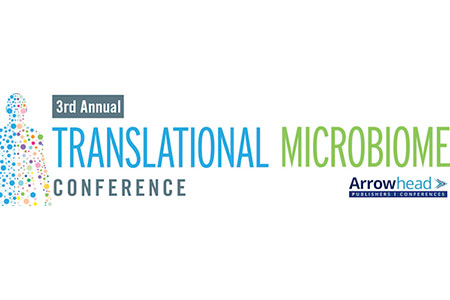Part I: Participants and Presentations
- Part I: Participants and Presentations
- Part II: Microbiome Workshop Topics
- Part III: Best Practices for Study Design

Participating Scientists
The microbiome workshop was led by Alexander Maue, PhD, director of microbiome products and services at Taconic Biosciences, and William DePaolo, PhD, associate professor of medicine at the University of Washington and director at the Center for Microbiome Sciences & Therapeutics (CMiST). CMiST provides investigators, clinicians and patients interested in the human microbiome a number of innovative services, facilitates collaboration and exploration through workshops and seminar series, and works alongside clinicians to develop and test microbiome-derived therapeutics.Faculty participants included:
- Beth McCormick, PhD, executive director at the University of Massachusetts Center for Microbiome
- James Matumba, PhD, co-founder of CommenSe and senior associate at PureTech
- Philip Dubé, PhD, field application scientist at Taconic Biosciences
Featured Presentations
Will DePaolo, PhD
In his presentation, Will DePaolo discussed three under-appreciated factors in microbiome study design:- First, DePaolo discussed the importance of gut site location. As each site in the gut has a unique environment and microbiota population, stool is not an accurate surrogate for individual intestinal sites. Rather, stool is representative of the entire gut but may not contain all organisms found in the gut.
- New insights from -omics and big data does not have to be the end of the scientific process, but can be used to guide and create it. For example, knowing what your microbiome is before you get sick would help you return to your normal microbiome when you are well again. Possessing the specific knowledge about your microbiome would be helpful to develop a tailored probiotic regimen to facilitate the return of your microbiome to its natural state as general probiotics are not going to be helpful.
- Finally, he told attendees it is okay to play with poop. For instance, water can be squeezed out of a stool sample containing metabolites and molecules produced by gut flora. This allows you to run studies with stool water rather than fecal microbiota transplantation (FMT) or bacteria.
Beth McCormick, PhD
Dr. McCormick highlighted the Center for Microbiome Research (CMR) at the University of Massachusetts Medical Center, where they study intestinal ecology and host-bacteria interactions. Research applications include:- Nutrition
- Inflammation
- Infectious disease
- Antibiotic stewardship
James Matumba, PhD
Dr. Matumba spoke about the rise in metabolic and immune diseases, especially in newborns, and the relationships between microbial diversity and health.For example:
- At three months old, there is a difference between the microbiome of healthy and asthmatic babies. That difference goes away as babies age.
- Broad-spectrum antibiotic administration leads to obesity.
- A 25% drop in alpha-diversity precedes diabetes.
Dr. Matumba asked if microbiome survey should be part of our normal pediatric health screening, as this could identify and correct predictive microbiome shifts before they lead to disease.
Check out Part II of this series to explore key workshop topics, focusing on the power and limitations of murine in vivo models in translational microbiome research.















.jpg)

.jpg)
.jpg)
.jpg)
.jpg)





.jpg)


.jpg)
.jpg)

.jpg)


.jpg)





.jpg)

.jpg)




